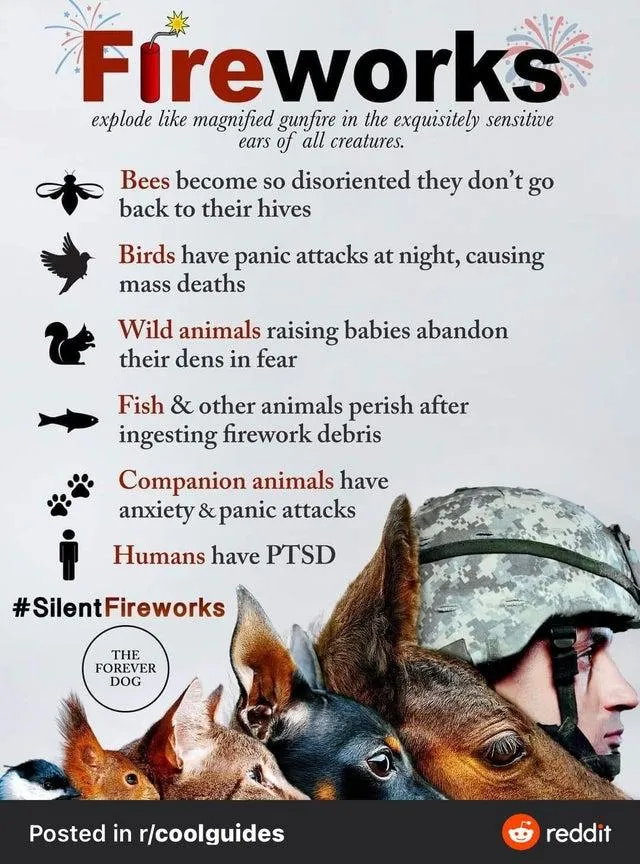Real and imagined issues with fireworks
Bronwyn Rideout - 6th December 2021
The 96-hour fireworks industry is both a source of joy and dread for New Zealanders nationwide. Fireworks can only be sold privately in this country between November 2nd and November 5th, and while this period is an ideal lead-in to Guy Fawkes Night, those of us living near pyrotechnic enthusiasts know all too well that amateur backyard displays will be a feature of our lives until late into the summer.
However, the sounds and sights of fireworks throughout the late-spring and early-summer may be a thing of the past. First, opinions about Guy Fawkes Night are changing. In New Zealand, town and city councils are directing their focus (and funds) towards Matariki (which is held in July), while celebrations in the United Kingdom are declining in many localities due to the rising popularity of Halloween, and controversies that surround questionable effigy choices (such as this story about an effigy made of the Grenfell Towers).
Secondly, the ongoing pandemic has had a contradictory impact on supply and availability of fireworks worldwide. Two years of lockdowns and missed celebrations are the perfect tinder for those who want to blow-off steam and blow-up things. While this increase in demand should signify a hefty pay-day, reduced transport capability and capacity has pushed shipping prices to a premium, with one purveyor of fine pyrotechnics stating that his shipping costs alone have increased by $20,000 - before increases in product costs are included; Stuff shared Bad Boy Fireworks owner James York’s claim that several small seller had approached him to buy-out their supplies. For communities that were keen to push forward with their own displays, attendance was limited by alert levels, while attempts to get fireworks out of Auckland were hampered.
Compounding this supply and demand issue is a third element: opinions about fireworks are simply changing. The Countdown supermarket chain stopped selling fireworks in 2019 while The Warehouses stopped in 2021, both as a result of consumer surveys. Customers of The Warehouse preferred public displays, while more than 25% were claimed to have stated that they did not participate in fireworks at all. Participants of the Countdown survey found that 66% of customers rarely or never bought fireworks. Even though they still enjoyed special occasions like Diwali, Chinese New year, Matariki, and Guy Fawkes, the inclusion of fireworks was not seen as necessary (the number of respondents in either survey has not been shared).
Chief rationale in both surveys were concerns for animal welfare, environmental impact, and neighbourhood disruption. Even if you are not on social media, talk around the water cooler or between Zoom meetings might be punctuated with tales of missing pets and broken sleep in the days after Guy Fawkes. If you are on social media you may have seen memes/(dis)infographics like the following:

The claims made on this particular image appear reasonable, as it confirms some behaviours that one may have observed personally, especially with regards to domestic pets. However, it still trends to the alarmist, as some of the claims here either misrepresent the complexity of human and animal behaviour or are not evidence-based.
Bees: There is no evidence to back up this specific claim, while anecdotes from beekeepers claim that bees are not bothered by fireworks. In fact, your porch light is more dangerous than fireworks, as bees are phototactic and will fly around artificial lights all night until they die. Such behaviours have been used by environment groups in Australia to protest against mining development near established apiaries. Predators or infestations by ants or mites are the most common causes of bee abscondment. Strong smells, frequent disruption of hives by beekeepers, and poor environmental conditions such as humidity, also contribute to population depletion.
Birds: This claim is true, but oversimplifies the issue. The mass death of 4,000 to 5,000 black birds in Arkansas on New Year’s in 2011, and hundreds of starlings, also on New Year’s, in Rome in 2021, were due to fireworks and firecrackers being set off illegally in areas where large populations of birds were roosting for the evening. Aside from egregious human error, the timing and location of these incidents were significant contributors, as birds roost together in larger numbers in the northern hemisphere winter than they do in the summer. Furthermore, professional fireworks are detonated in areas that are intended to cause the least disturbance to wildlife, whereas in the case of Rome, firecrackers were set off in the immediate vicinity of birds roosting in the trees that lined an urban neighbourhood.
Thunderstorms are not a comparable event, as birds have higher sensitivity to the changes in humidity, temperature, aid pressure, and sound that precede bad weather, and are able to behave accordingly.
Nest abandonment/abandonment of young: A 2008 study conducted in the town of Gualala, California demonstrated that seabirds did abandon their nests when fireworks were set off near the nesting sites. However, evidence that this applies to wild animals is sparse, although the claims are repeated on animal shelter and animal rights websites. Researchers attribute this to the difficulty of monitoring animal behaviour at night, when fireworks are normally displayed.
Pollution: Pollution is a legitimate concern and problem surrounding fireworks. Modern day fireworks are constructed from non-biodegradable plastic, and debris has been found in the digestive systems of various animals. Smoke also adds to air pollution.
PTSD: A Saskatoon city councillor Pat Lorje came under fire in 2016 for making the following tweet:
”I hope someone warned the Syrian refugees that the booms, bangs & other noise wasn’t from weapons,”
Following up with:
“Amazed that so many people do not know of connection between PTSD of war victims & soldiers, and fireworks which often triggers anxiety”
While the councillor came under fire for her generalisations of refugees, they weren’t completely incorrect. They may, however, have been a little behind the ball so to speak, as a local group that supports refugees and immigrants actively informs its members of upcoming fireworks shows, an action which has been effective for refugee groups overseas. Shawn Gourley, who co-founded the group “Military with PTSD”, has been quoted multiple times saying that it isn’t planned fireworks that are triggering, but rather unexpected fireworks and explosions that are the real problem.
However, this wouldn’t be a skeptical article without considering if there is a scam or questionable practice behind the scenes.
And is there ever!
This meme is courtesy of “The Forever Dog”, a book and website which champions pseudoscience and keto diets as a means to elongate the life of your best four-legged friend. A full take down of this book and its writers, Dr. Karen Becker (Integrative Pet care expert at Mercola.com) and Rodney Habib ( a ‘social media influencer’), was written on the anonymous blog Skeptvet. Skeptvet’s entire blog is worth the read if you are interested in how alternative medicine is pervasive in veterinary science.
The meme above does have a couple of valid points, but the rest are easily resolved when we can finally forgo the homespun fireworks in favour of displays that are considerately timed, organised, and curated to benefit the local wildlife and vulnerable members of the community.
